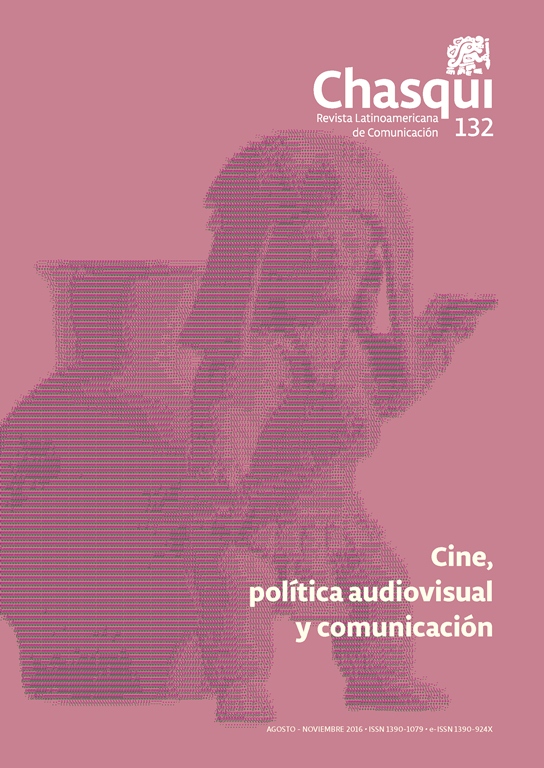Celso Furtado. Culture and film policy
DOI:
https://doi.org/10.16921/chasqui.v0i132.2929Keywords:
cultural policy, Celso Furtado, cinema, BrazilAbstract
This paper aims to understand the gap of cultural policy of the years 1980-1990, called time of transition, and the cultural and political ideas of Celso Furtado, minister of culture from 1986 to 1988. How we move from a forged cultural policy during the dictatorship to another? What are the ideas that guided Celso Furtado in this change to a democratic opening situation? In this sense, the cultural policy implemented by Celso Furtado, particularly the film policy, by presenting itself as a unique landmark, is the primary focus of research.References
Bolaño, C. (2004). Mercado brasileiro de televisão. São Cristóvão: Universidade Federal de Sergipe, São Paulo: EDUC.
Cepêda, V. A. (2003). O pensamento político de Celso Furtado: desenvolvimento e democracia. Gramci e o Brasil. Recuperado de http://bit.ly/2fcbvEd.
Corbisier, R. (1960). Formação e problema da cultura brasileira: textos brasileiros de filosofia. Rio de Janeiro, Instituto Superior de Estudos Brasileiros (MEC).
D’Aguiar, R.F. (2013). Celso Furtado e a dimensão cultural do desenvolvimento. Rio de Janeiro: E-papers, Centro Internacional Celso Furtado. Dahl, G. Cinemateca, manuscrito, AGD PI 00044.
Esteves, C.R. (2013). Celso Furtado, intérprete do Brasil: desenvolvimento como cultura no pensamento social brasileiro. Dissertação de Mestrado. Programa de Pós-graduação em Planejamento Urbano e Regional da Universidade Federal do Rio de Janeiro: Rio de Janeiro.
Estevinho, T.A.D. (2003). Este milhão é meu. Estado e cinema no Brasil (1984-1989). Dissertação de Mestrado defendido no Programa de Estudos Pós-graduados em Ciências Sociais, PUC: São Paulo.
Farias, R. (2005). Embrafilme, Pra Frente, Brasil! e algumas questões. En: Simis, A. (Ed.). Cinema e televisão durante a ditadura militar: depoimentos e reflexões (pp. 11-25). Araraquara: Laboratório Editorial FCL/UNESP.
Furtado, C. & D’Aguiar, R.F. (Eds.) (2012). Ensaios sobre cultura e o Ministério da Cultura. Rio de Janeiro: Contraponto, Centro Internacional Celso Furtado.
Furtado, C. (1984). Cultura e Desenvolvimento em época de crise. Rio de Janeiro: Paz e Terra.
Furtado, C. (1987). Entrevista ao programa Roda Viva, TV Cultura, 09/02/1987.
Furtado, C. (1999). Formação cultural do Brasil. En: O longo amanhecer: reflexões sobre a formação do Brasil (pp. 57-68). Rio de Janeiro: Paz e Terra.
Ortiz, R. (2008). Cultura e desenvolvimento. Políticas Culturais em Revista, 1(1), 122-128. Recuperado de http://bit.ly/2e36azo.
Simis, A. (2008). Concine – 1976 a 1990. Políticas Culturais em Revista, 1(1), 36-55. Recuperado de http://bit.ly/2f1WAK2.
Simis, A. (2010). Cinema e política cinematográfica. Economia da Arte e da Cultura. São Paulo: Itaú Cultural, 137-164.
Simis, A. (2015). Uma releitura de “Formação Cultural do Brasil”. En: Marques De Melo, J. e Moreira Fernandes, G. (Eds.). Pensamento comunicacional brasileiro: o legado das ciências humanas. Volúmen II: Cultura E Poder. São Paulo: Paulus.
Downloads
Published
Issue
Section
License
- Authors retain copyright and grant the journal right of first publication with the work simultaneously licensed under a Creative Commons Attribution-NoDerivs License (CC BY-ND) that allows others to share the work with an acknowledgement of the work's authorship and initial publication in this journal.
- Authors are able to enter into separate, additional contractual arrangements for the non-exclusive distribution of the journal's published version of the work (e.g., post it to an institutional repository or publish it in a book), with an acknowledgement of its initial publication in this journal.
- Authors are permitted and encouraged to post their work online.

